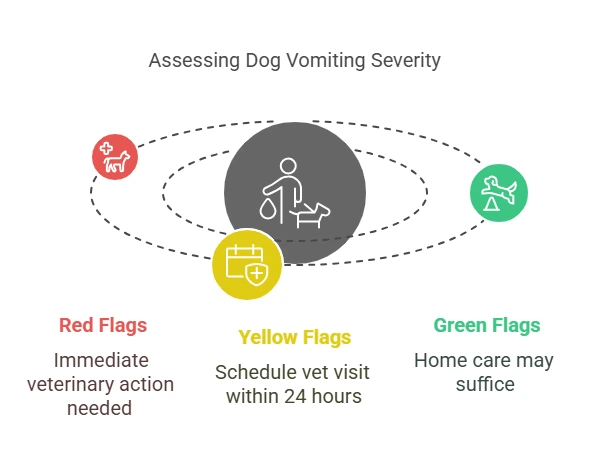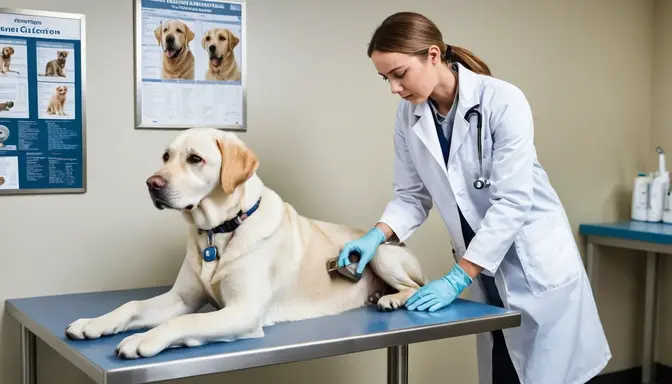Your dog just vomited, and now you’re staring at the mess, wondering if it’s a minor hiccup or a sign of something serious. You’re not alone—dog vomiting is one of the most common concerns pet owners face. But before you panic, let’s break down what’s happening inside your pup’s body and how to respond wisely.
Is It Vomiting or Regurgitation? Know the Difference
Not all “throw-ups” are the same. Recognizing the difference between vomiting and regurgitation can help you act faster:
- Vomiting involves forceful abdominal contractions and partially digested food or bile. It often signals stomach irritation, infections, or systemic issues.
- Regurgitation is passive, with undigested food or liquid appearing suddenly, usually due to esophageal problems or eating too fast.
Why Do Dogs Vomit? A Quick Look Inside
Dogs vomit for countless reasons, ranging from harmless to life-threatening. Their curious nature—sniffing, licking, and eating anything—makes their stomachs a battleground. Common triggers include:
- Dietary mishaps: Sudden food changes, scavenging garbage, or gulping meals too quickly.
- Toxins: Chocolate, grapes, or household chemicals.
- Underlying conditions: Parasites, kidney disease, or pancreatitis.
When Should You Worry?
While occasional vomiting might resolve on its own, certain signs demand immediate action:
🚨 Red flags:
- Vomiting blood or coffee-ground-like material.
- Repeated episodes within 24 hours.
- Lethargy, bloating, or unresponsiveness.
If you notice these, skip the home remedies and contact your vet or an emergency animal hospital.
Yellow Flags (Schedule a Vet Visit Within 24 Hours):
🟡 Intermittent Vomiting: 1–2 episodes daily for over 48 hours.
🟡 Weight Loss: Coupled with dull coat or lethargy.
🟡 Dehydration: Test by pinching the skin; if it tents, fluids are critical.
Green Flags (Home Care May Suffice):
🟢 Single Episode: No other symptoms, the dog remains playful.
🟢 Known Trigger: E.g., eating grass or a minor dietary change.

Why Prompt Action Matters
Ignoring persistent vomiting can lead to dehydration, nutrient loss, or worsening conditions. For example, yellow bile might mean an empty stomach, but paired with diarrhea, it could point to parvovirus—a deadly infection in unvaccinated puppies.
Stay calm, observe symptoms, and trust your instincts. In the next section, we’ll dive deeper into common causes and how to support your dog through recovery.
Common Causes of Dog Vomiting
Your dog’s vomiting episode might feel like a mystery, but there’s always a reason—even if it’s as simple as a squirrel-watching adrenaline rush. Let’s explore the most common causes of dog vomiting, from “oops, I ate grass” moments to hidden health issues.
Dietary Drama: When Food Becomes the Enemy
Dogs aren’t exactly gourmet critics—they’ll happily wolf down pizza crusts or cat litter. But their enthusiasm often backfires:
- Speed-eating syndrome: Gulping food too fast traps air, causing regurgitation of slimy, undigested kibble.
- Pro Tip: Try a slow-feed bowl or scatter meals on a lick mat.
- Dietary indiscretion: Spoiled trash, fatty scraps, or sudden food switches irritate sensitive stomachs.
- Food allergies: Chronic vomiting paired with itchy skin? Your pup might hate chicken or grains (AKC on Dog Allergies).
Bugs, Germs, and Hidden Illnesses
Sometimes vomiting is a red flag for underlying conditions. Watch for these stealthy culprits:
- Parvovirus: A deadly virus in unvaccinated pups, causing violent vomiting and bloody stool.
- Pancreatitis: Rich foods (think bacon grease) inflame the pancreas, leading to yellow vomit and a hunched posture.
- Kidney disease: Toxins build up when kidneys fail, triggering nausea. Senior dogs are especially at risk.
Toxins and Trouble: The Dangerous Stuff
Dogs explore the world with their mouths—unfortunately, that includes antifreeze puddles and chocolate bars. Act fast if you suspect:
- Human foods: Grapes, xylitol (in sugar-free gum), and onions are silent killers.
- Household hazards: Lilies, rat poison, or cleaning chemicals.
- Foreign objects: Socks, bones, or toys blocking the gut cause projectile vomiting.
Real-Life Example:
Bailey, a 3-year-old Lab, vomited 4 times after digging into a compost pile. Her owner found moldy coffee grounds in the mess—a toxic risk. A rush to the vet saved her from seizures.
Why Timing Matters With Chronic Vomiting
Occasional puking isn’t unusual, but patterns matter. A dog who vomits weekly could have:
- Parasites: Worms steal nutrients and irritate the gut.
- Stress-induced gastritis: Anxiety from fireworks or vet visits can upset the stomach.
- Bloat (GDV): A twisted stomach, common in deep-chested breeds, causes unproductive vomiting and requires immediate surgery.
While some causes are mild, others—like toxins or parvovirus—turn critical within hours. Track symptoms, note vomit color/texture, and call your vet if you’re unsure. Up next: When to panic and when to wait it out.
When to Call the Vet Immediately
As a pet owner, you’ve probably cleaned up your fair share of vomit. But how do you know when it’s more than just an upset stomach? While some cases of dog vomiting resolve on their own, others scream, “Get to the vet now!” Let’s break down the red flags that demand immediate action.

🚨 Red Flags: Symptoms That Can’t Wait
Not all vomiting is created equal. If your dog shows any of these signs, don’t wait—call your vet or an emergency animal hospital:
- Repeated vomiting: More than 2-3 episodes in 24 hours.
- Blood in vomit: Bright red or coffee-ground-like material signals internal bleeding.
- Lethargy or weakness: A dog who won’t lift their head or play is a major concern.
- Bloated abdomen: A hard, swollen belly could mean bloat (GDV), a life-threatening condition.
- Unproductive vomiting: Dry heaving without bringing anything up is a classic sign of bloat.
Why Timing Is Critical
Delaying care for serious conditions can have devastating consequences. For example:
- Bloat (GDV): This condition kills within hours if untreated. The stomach twists, cutting off blood flow and trapping gas.
- Toxin ingestion: Chocolate, xylitol, or antifreeze can cause organ failure if not treated promptly.
- Parvovirus: Puppies with parvo deteriorate rapidly, often dying from dehydration without IV fluids.
What to Do While You Wait
If you’re rushing to the vet, here’s how to help your dog en route:
- Stay calm: Your dog picks up on your stress. Speak softly and keep them comfortable.
- Bring a sample: If possible, collect a vomit sample in a clean bag for the vet to analyze.
- Note symptoms: Track when vomiting started, frequency, and any unusual behavior.
Real-Life Emergency:
Max, a 5-year-old Golden Retriever, started vomiting after chewing on a sugar-free gum wrapper. His owner noticed lethargy and uncoordinated movements—classic signs of xylitol poisoning. A quick trip to the emergency vet saved his life.
When It’s Not an Emergency
Sometimes, vomiting is scary but not life-threatening. Monitor your dog closely if:
- They vomit once but otherwise act normal.
- The vomit contains grass or undigested food.
- They’re hydrated (check by lifting their skin—it should snap back quickly).
Trust your gut. If something feels off, it’s better to err on the side of caution. In the next section, we’ll cover safe home remedies for mild cases of vomiting.
Home Care for Mild Cases
Not every case of dog vomiting requires a frantic trip to the vet. If your pup seems otherwise healthy—no blood, no lethargy, no bloating—you can often manage mild vomiting at home. Here’s how to nurse your furry friend back to health safely and effectively.
The 12-Hour Fast: Giving the Stomach a Break
When your dog vomits, their stomach is irritated and needs time to recover. A short fast can work wonders:
- Step 1: Remove food for 12-24 hours.
- Step 2: Offer small amounts of water or ice cubes every few hours to prevent dehydration.
- Step 3: Gradually reintroduce food with a bland diet (more on that below).
Pro Tip: Puppies and small breeds shouldn’t fast for more than 12 hours—they’re prone to low blood sugar.
The Bland Diet: Gentle Nutrition for Recovery
Once the fast is over, it’s time to reintroduce food—slowly and carefully. A bland diet is easy on the stomach and helps reset digestion:
- What to feed:
- Boiled chicken (skinless, boneless) or lean ground turkey.
- Plain white rice or mashed sweet potatoes.
- Canned pumpkin (not pie filling) for fiber.
- How to feed:
- Start with small portions (1-2 tablespoons) every 3-4 hours.
- Gradually increase the amount over 1-2 days.
Natural Remedies to Soothe the Stomach
Sometimes, a little extra help can speed up recovery. Try these vet-approved remedies:
- Ginger: A natural anti-nausea agent. Offer a small piece of fresh ginger or ginger tea (cooled).
- Probiotics: Restore gut health with dog-specific probiotics.
- Bone broth: Warm, low-sodium broth encourages hydration and provides nutrients.
Warning: Avoid human medications like Pepto-Bismol unless directed by your vet—they can be toxic to dogs.
Luna, a 7-year-old Beagle, vomited after scavenging leftover BBQ. Her owner fasted her for 12 hours, then fed a bland diet of chicken and rice. Within 48 hours, Luna was back to her playful self.
When to Transition Back to Regular Food
Once your dog’s vomiting has stopped and they’re keeping the bland diet down, you can slowly reintroduce their regular food:
- Day 1: Mix 25% regular food with a 75% bland diet.
- Day 2: Increase to 50/50.
- Day 3: Transition to 75% regular food and 25% bland diet.
- Day 4: Fully return to their normal meals.
Home care can be effective for mild cases but always monitor your dog closely. If symptoms persist or worsen, stop home treatment and consult your vet. Up next: Preventing future vomiting episodes.
Preventing Future Episodes
Nobody wants to clean up vomit—or see their pup feeling miserable. The good news? Many cases of dog vomiting are preventable with a few simple changes to your dog’s routine and environment. Let’s explore how to keep your furry friend’s tummy trouble-free.
Slow Down, Chow Hound!
If your dog inhales their food like a vacuum, they’re more likely to vomit or regurgitate. Here’s how to slow them down:
- Use a slow-feed bowl: These bowls have ridges or mazes that force dogs to eat more slowly.
- Try puzzle feeders: Turn mealtime into a brain game with toys that dispense kibble.
- Divide meals: Offer smaller portions 3-4 times a day instead of one or two large meals.
Ditch the Table Scraps
As tempting as it is to share your dinner, human food is a common cause of dog vomiting. Avoid these risky foods:
- Fatty foods: Bacon, fried chicken, and cheese can trigger pancreatitis.
- Toxic ingredients: Chocolate, grapes, onions, and xylitol are dangerous.
- Bones: Cooked bones can splinter and cause blockages or tears.
Keep Toxins Out of Reach
Dogs are curious creatures, and their curiosity can land them in trouble. Protect your pup by:
- Securing trash cans: Use lids or store bins in cabinets.
- Storing chemicals safely: Keep cleaning products, antifreeze, and medications in high cabinets.
- Choosing pet-safe plants: Avoid lilies, azaleas, and sago palms.
Regular Vet Checkups: Prevention Is Key
Routine vet visits can catch underlying issues before they cause vomiting. Ask your vet about:
- Vaccinations: Protect against parvovirus and other illnesses.
- Parasite prevention: Deworming and flea/tick treatments keep the gut healthy.
- Diet advice: Your vet can recommend a food that suits your dog’s age, breed, and health needs.
Real-Life Prevention Tip:
After Bella, a 4-year-old Boxer, vomited twice a month, her owner switched to a high-quality, grain-free diet and started using a slow-feed bowl. Bella hasn’t thrown up since!
Stress Management: Calm Tummies, Calm Minds
Stress and anxiety can upset your dog’s stomach just like yours. Help them relax by:
- Creating a safe space: A cozy crate or quiet room can reduce anxiety during storms or fireworks.
- Using calming aids: Try pheromone diffusers, calming collars, or vet-approved supplements.
- Sticking to a routine: Dogs thrive on consistency—feed, walk, and play at the same times daily.
Preventing dog vomiting is all about proactive care—slow feeding, avoiding toxins, and regular vet visits. By making these small changes, you can save yourself (and your pup) a lot of stress.
Conclusion: Prioritize Your Dog’s Health and Happiness
Dealing with dog vomiting can feel overwhelming, but armed with the right knowledge, you can handle it like a pro. Whether it’s a minor tummy upset or a sign of something more serious, your quick thinking and care make all the difference. Let’s recap what we’ve covered and leave you with a final dose of confidence.
Key Takeaways for Every Pet Owner
- Know the signs: Vomiting vs. regurgitation, red flags like blood or lethargy, and when to call the vet.
- Act fast: For emergencies like bloat or toxin ingestion, every minute counts.
- Home care works: Fasting, bland diets, and natural remedies can soothe mild cases.
- Prevention is power: Slow feeders, safe foods, and regular vet visits keep your dog healthy.
Your Role as a Pet Parent
Your dog relies on you to be their advocate and protector. By staying informed and proactive, you’re not just preventing vomiting—you’re ensuring a longer, happier life for your furry friend. Remember:
- Trust your instincts: If something feels off, don’t hesitate to call your vet.
- Stay prepared: Keep emergency numbers handy, like your vet’s office and the ASPCA Animal Poison Control.
- Celebrate small wins: A resolved vomiting episode is a victory worth celebrating!
Real-Life Inspiration:
After a scary night of vomiting, Max’s owner learned about bloat and invested in a slow-feed bowl. Now, Max eats safely, and his owner sleeps soundly, knowing he’s prepared for anything.
Final Thoughts
Dog vomiting is a common issue, but it doesn’t have to be a recurring nightmare. With the tips and strategies in this guide, you’re equipped to handle everything from minor upsets to emergencies. Bookmark this page, share it with fellow pet lovers, and remember: that your dog’s health is worth every effort.




